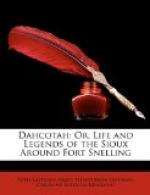Jealous for the honor of the long-reverenced feasts of the Dahcotahs—the “Deer Killer” thought not for a moment of the sorrow and disgrace he would bring upon Wenona, while Wauska loved the warrior more than ever, triumphing in his preference of her, above her companion. And Wenona—
A cloud came o’er
the prospect of her life,
And evening did set
in
Early, and dark and
deadly.
But she loved too truly to be jealous, and departed without the revenge that most Indian women would have sought, and accomplished too. Her silence on the subject of her early trial induced her friends to believe that her mind was affected, a situation caused by long and intense suffering, and followed by neglect; in such cases the invalid is said to have no heart.
The girl from whom I have attempted to draw the character of Wauska, I knew well.
Good looking, with teeth like pearls, her laugh was perfect music. Often have I been roused from my sewing or reading, by hearing the ringing notes, as they were answered by the children. She generally announced herself by a laugh, and was welcomed by one in return.
She was pettish withal, and easily offended, and if refused calico for an okendokenda, or beads, or ribbon to ornament some part of her dress, she would sullenly rest her chin on her hand, until pacified with a present, or the promise of one.
It is in Indian life as in ours—youth believes and trusts, and advancing years bring the consciousness of the trials of life; the necessity of enduring, and in some cases the power to overcome them. Who but she who suffers it, can conceive the Sioux woman’s greatest trial—to feel that the love that is her right, is gone! to see another take the place by the household fire, that was hers; to be last where she was first.
It may require some apology that Wauska should have vowed destruction upon herself if the Deer Killer took another wife, and yet should have lived on and become that most unromantic of all characters—a virago. She was reconciled in time to what was inevitable, and as there are many wives among the Sioux, there must be the proportion of scolding ones. So I plead guilty to the charge of wanting sentiment, choosing rather to be true to nature. And there is this consideration: if there be among the Dahcotahs some Catharines, there are many Petruchios.
* * * * *
A group of Indian girls were seated on the grass, Wauska in the centre, her merry musical laugh echoed back by all but Wenona. The leaves of the large forest tree under which they were sheltered seemed to vibrate to the joyous sounds, stirred as they were by a light breeze that blew from the St. Peter’s. Hark! they laugh again, and “old John” wakes up from his noon-day nap and turns a curious, reproving look to the noisy party, and Shah-co-pee, the orator of the Sioux, moves towards them, anxious to find out the cause of their mirth.




